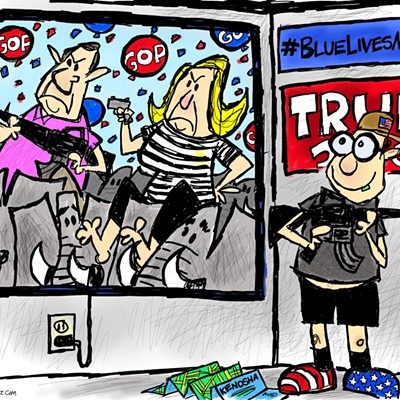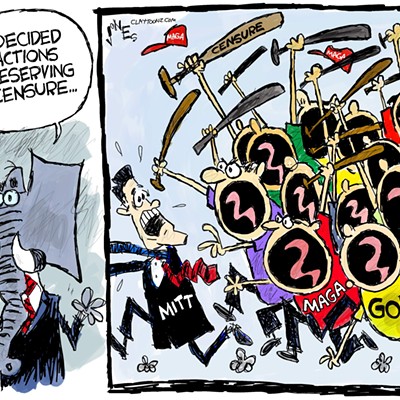That rising market has brought a corresponding increase in property values down at the Pima County Assessor's Office, where assessments have climbed on average by roughly 8 percent annually for the last four years, according to retiring Pima County Assessor Rick Lyons.
Since those values play a key role in determining property taxes, the end result has been higher tax bills for most county residents.
Those rising property taxes are the emerging issue in the race to succeed Lyons, who is stepping down after 10 years in office. In the Republican primary that voters will decide on Sept. 7, Bill Heuisler is vowing to virtually freeze property values to put an end to annual tax hikes, while Roger Condra says he'll stick to the current method of following the market to maintain similar values among similar properties.
The debate centers on the relatively arcane world of property taxes, where rates from various jurisdictions are stacked upon one another, topped with bond debt and then multiplied into formulas that involve percentages of full cash value with a twist of assessment ratios.
Scratching your head? You're not alone. Put simply, property owners pay taxes to the county, Pima Community College, various school districts, the city of Tucson and a handful of other jurisdictions based on the value of their property on the county tax rolls, which are overseen by the county assessor.
Lyons, who has been with the assessor's office for 34 years, maintains that he's increased property values based on the market, because it's the only way to ensure that similar properties bear similar tax burdens.
"I believe in the market value standard, because we are capitalists, and we see markets as being fair and objective," Lyons says.
Heuisler argues that raising values of houses that haven't sold based on the current market is the wrong approach to running the assessor's office. He says property values should rise by 1 or 2 percent a year at the most, unless a property is sold. Under the current system, he says, rising property tax bills are driving seniors from their homes and pinching the poor.
"How can you assess a house based on what a person's going to sell it for?" asks Heuisler. "It's unreasonable; it's inequitable; it's unfair. Government is literally confiscating property in Pima County and driving businesses out of Pima County. And it's wrong, and it's gonna stop."
Condra, his GOP opponent, falls more into the incumbent's camp, saying that the current approach spreads the tax burden in an equitable manner--a notion that brings a contemptuous growl from Heuisler.
"Equitable distribution of the tax?" Heuisler says. "Give me a break. We're not distributing taxes. Tax is something you do to people. You distribute services. You inflict tax burden."
And if the tax burden varies from home to home? "I don't care if government sees a disparity," says Heuisler. "It's not my problem."
Condra responds, "I don't think that's right. If I bought the house I'm living in 10 years ago, and I'm paying $1,000 a month, and the guy next door to me buys his house two weeks ago, and now he has to pay $3,000 for the same house, I don't see that's fair at all."
Heuisler's been making his property-tax arguments for about a quarter of a century. After California voters, faced with increasing property taxes, passed a proposition that froze values in 1978, Heuisler headed up Citizens for Tax Relief, an outfit that led a 1980 effort to pass a similar initiative in Arizona. Voters rejected the proposition, although they passed an alternative proposal put on the ballot by the state Legislature that provided relief from the state if tax rates rose too high.
Heuisler went on to run unsuccessfully for the Tucson City Council and the Pima County Board of Supervisors. He managed the Southern Arizona effort for Republican Evan Mecham's gubernatorial campaign in 1986 and went to work for Mecham's administration in 1987 to investigate waste, fraud and abuse in areas such as the Department of Corrections.
Following Mecham's 1988 impeachment, Heuisler slipped back behind the scenes, working quietly against to defeat Republicans who supported Mecham's impeachment. He'd avoided high-profile politicking until steadily rising assessments of his new home sparked a new fire in his belly.
"Who better than me?" he asks. "I know the system. I know the flaws in the system."
Condra, meanwhile, is a political rookie making a first run for office. A Texas transplant who worked in real estate before an eight-year stint in the assessor's office, Condra spent the last year teaching a course on homebuilding at Sahuaro High School.
Condra says he's seeking the office because he thinks his experience can make the operation more efficient.
He says Heuisler's scheme to freeze values will bring nothing but chaos to the local office and trouble from the Arizona Department of Revenue.
"The assessor's office values property," Condra says. "There are statutes and guidelines which we have to follow."
Besides, he adds, even if values were frozen, it would just mean that different jurisdiction would raise their tax rates.
"Flowing Wells School District is not going to do with 10 percent less funding because I, as the assessor, said, 'Everybody in your area, we're going to drop 10 percent.' It's not going to work that way. The rates go up," Condra says.
From Heuisler's perspective, that's when the tax-hike cycle will be broken. Rising property values have protected elected officials such as Pima County supervisors, who haven't needed to raise tax rates because increased property values have given them a steady stream of additional revenue. But if they had raised rates, then they might have seen a challenge.
The only way to stem property tax hikes, he reasons, is to virtually freeze values, forcing other elected officials to make the decision to raise taxes.
"You're supposed to be able to vote for the people who raise your taxes," Heuisler says. "Why in the hell do we elect the assessor? If we elect the assessor, and he doesn't do what we want him to do, then we get rid of him and elect somebody who does."
The winner will face Democrat Bill Staples, who has worked as an appraiser in the county's Transportation and Flood Control Department, in the Nov. 2 general election.

















